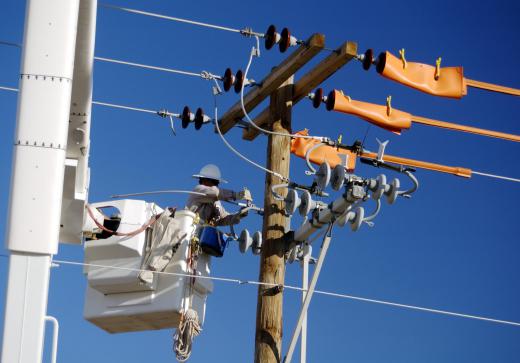A surge arrester is device that intercepts electrical surges and sends the spike to ground before it can hurt a connected device. These arresters are also known as surge protectors or lightning arresters, but there are some very small differences between these devices. In most cases, when a surge arrester intercepts a power surge, it fuses itself to prevent transmission. This will stop the surge, but it also destroys the device. If the arrester is improperly installed, this fusion can cause more problems than the initial surge.
The differences between a surge arrester, a surge protector and a lightning arrester are very minor. In many cases, these differences are more of a tendency than an actual technological difference. In fact, these terms may be used interchangeably and still be correct.

The main differences between a lightning arrester and a surge protector are time and position. In the past, there were only lightning arresters, since lightning was the only place where big power surges would come from. Now, a lighting arrester typically prevents surges from outside the electrical grid, and a surge protector prevents ones from inside.

Surge protectors also protect against grid surges, but they do it in a different way. They protect systems by plugging into the wall, so they always have direct connections to the power grid. A device may be placed on any line that carries electricity. There are devices that plug into standard electrical cord, coaxial cables, even speaker wire. In addition, a surge protector is a long-term device, while a surge arrester is a form of disposable protection.
From an industrial standpoint, there are only two different types of protection. A surge protector prevents overloads across electric power lines only. These devices work similarly to the home version; they are connected to the wall and a protected machine, but they will operate at much higher voltages. These devices won’t necessarily be harmed by surges.
Industrial lightning arresters and surge arresters are the same thing. They connect to any power-transferring line, whether it is connected to the wall or between two machines. These are nearly always destroyed by surges, regardless of position. Many machines have a surge protector protecting the machine from the wall and a surge arrester protecting internal systems.
Surge arresters work by fusing the line that goes to the protected device. This prevents voltage from traveling into the device and pushes it out through a ground system instead. This is both the biggest strength and biggest danger of a surge arrester. If the ground system is installed properly, the arrester will work fine. If the ground system is faulty, then the voltage has nowhere to go and can travel back up the line or even start a fire.
